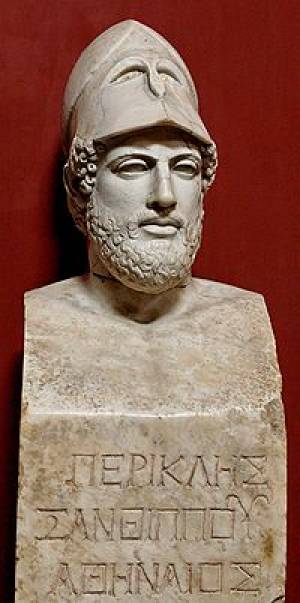Table of Contents
<html>
<a href=“http://lucianofsamosata.info/wiki/doku.php?id=submission_page”><img src=“http://lucianofsamosata.info/images/contact.png” /></a>
</html>
Admiration of Pericles
<html><p xmlns:dct=“http://purl.org/dc/terms/”><a rel=“license” href=“http://creativecommons.org/publicdomain/mark/1.0/”><img src=“http://i.creativecommons.org/p/mark/1.0/88x31.png” style=“border-style: none;” alt=“Public Domain Mark” /></a><br />This work (by <a href=“https://lucianofsamosata.info/wiki” rel=“dct:creator”>https://lucianofsamosata.info/wiki</a>), identified by <a href=“http://meninpublishing.org” rel=“dct:publisher”><span property=“dct:title”>Frank Redmond</span></a>, is free of known copyright restrictions.</p></html>
Authored by Frank Redmond, 2005
If there was one person who Thucydides universally admires, it would have to be Pericles. Out of all the major characters in the History, Thucydides upholds Pericles as the model future citizens should follow. This is plainly seen with Thucydides' judgment of Pericles in Book Two. If one looks at what Thucydides has to say about Pericles, it becomes clear that Thucydides feels that Pericles is the greatest man of his time and is perhaps the greatest man for many generations to come. ThucydidesÕ reckoning of Pericles can be found at 2.65.
From the beginning of the passage, Pericles is depicted as collected and ready to battle the outcry that had arisen at Athens. Thus it says, “Pericles tried to appease the anger of the Athenians and to divert their attention from their present afflictions” (2.65). However, Pericles would suffer from the Athenians, because the Athenians were upset over what the war had brought them - a loss of their fine possessions, along with their houses and costly furnishings. Athens was at war instead of at peace due in large part to Pericles. Thucydides tells us of their discontent as a way to show how resilient Pericles was. For even after the mob accused him of causing all these things, he was reelected general and all public affairs were turned over to him. The people, or should I say the mob, could not resist bringing back the only man capable of leading the sheep out to the fields. Usually when a person is castigated, they do not rebound from that treatment. However, Pericles was so magnanimous that not only does he rebound, he comes back with as much power as before, as if nothing had happened.
This leads Thucydides to say that “as long as [Pericles] was at the head of the city in time of peace, he governed it with moderation and guarded it securely; and it was greatest under him” (2.65). These elements, moderation and security, are two highly prized attributes to Thucydides. Pericles is therefore the paragon of all that Thucydides upholds as good. It is precisely these elements that makes Pericles excel over all other people of his time.
To elaborate further, Thucydides blankly says that “the reason for Pericles' success was this: he was powerful because of his prestige and his intelligence, and also because he was known to be highly incorruptible” (2.65). Pericles is clearly the keenest thoroughbred of his times, galloping over all the competition. He seems, at least according to Thucydides, to be indestructible, incapable of being struck down. His power was so great that he could do whatever he liked. Thus Thucydides says, “Athens was in name a democracy, but in fact was a government by its first man” (2.65). No other leader would hold so much sway after the death of Pericles, nor could they, for Pericles had the stuff out which great men are made of. Even a magnanimous man like Nicias or a enterprising man like Alcibiades, as great as they were, never had the influence and power that Pericles had.
The last words of 2.65 - “So Pericles had more than enough reasons to predict that the city might easily outlast the Peloponnesians in this war” - is the last we hear of Pericles in the History. Is it only fitting that his last mention is coupled with the success of the Athenians over the Peloponnesians, something that obviously did not occur. So why does Thucydides couple these two together? Clearly, Thucydides is implying that if Pericles survived the Plague, he would have led the Athenians to success and would have avoided failures like the Sicilian Expedition. If only the Athenians had heeded Pericles words, took care of the navy, were quiet, did not seek to expand the empire, and did not endanger the city itself, the results would have been different. But Pericles dies, and history roars on.
In order understand Thucydides, his intentions, his thoughts, it is imperative to look at Pericles, because Thucydides and Pericles are very often of one mind. Thucydides so greatly admires Pericles because he sees himself in Pericles' shadow. Thucydies emulates Pericles. Pericles was the perfect ruler to Thucydides.
